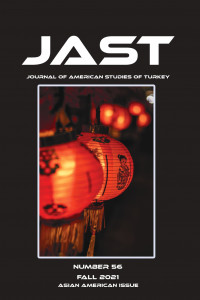Towards and Across Third Cultures: South Asian American Transnationalisms and Rhizomatic Subjectivities in Jhumpa Lahiri’s Oeuvre
Abstract
Physically and/or figuratively, Bengali American writer
Jhumpa Lahiri’s hybrid protagonists transcend national borders and
form dynamic subjectivities that resist simplified assumptions about
transnational migration. However, while some characters like to either
accentuate their ancestral South Asian heritage or endorse their assimilation to the United States, others rejoice in embracing third cultures or
embarking on unexpected journeys without fixed points, thereby questioning the restrictive container of the nation-state as the dominant category for examining society. Sustained by Homi K. Bhabha’s and Stuart Hall’s theoretical approaches to cultural identity and influenced by
Gilles Deleuze and Félix Guattari’s rhizomatic thinking, I will focus on
Lahiri’s autobiography and her fiction in English that portrays characters who, overexerted by the constraints of the two cultures wanting to
claim them, find refuge in a third culture or defy the nation-state completely by considering themselves citizens of the world, or nomads.
References
- Austin, Patrycja. “High Walls in The Lowland: Nomadic Sensibility in Jhumpa Lahiri’s Novel.” Assimilation: A Good or Bad Word?, edited by Michal Peprník, Palacký University Olomouc, 2016, pp. 171-86.
- Bhabha, Homi K. The Location of Culture. Routledge, 1994.
- Bruneau, Michel. “Diasporas, Transnational Spaces and Communities.” Diaspora and Transnationalism: Concepts, Theories and Methods, edited by Rainer Bauböck and Thomas Faist, Amsterdam UP, 2010, pp. 35-49.
- Deleuze, Gilles, and Felix Guattari. 1980. A Thousand Plateaus: Capitalism and Schizophrenia. Translated by Brian Massumi, U of Minnesota P, 1987.
- Dutt-Ballerstadt, Reshmi. “Gendered (Be)Longing: First- and Second-Generation Migrants in the Works of Jhumpa Lahiri.” Naming Jhumpa Lahiri: Canons and Controversies, edited by Lavina Dhingra and Floyd Cheung, Lexington Books, 2012, pp. 157-80.
- Gilroy, Paul. The Black Atlantic: Modernity and Double Consciousness. Verso, 1993. Lahiri, Jhumpa. Dove Mi Trovo. Guanda, 2018.
- ---. “Going Ashore.” Unaccustomed Earth, Bloomsbury, 2008, pp. 294-333.
- ---. In Other Words. 2015. Translated by Ann Goldstein, Alfred A. Knopf, 2016.
- ---. “Once in a Lifetime.” Unaccustomed Earth, Bloomsbury, 2008, pp. 223-51.
- ---. “Only Goodness.” Unaccustomed Earth, Bloomsbury, 2008, pp. 128-73.
- ---. The Lowland. Bloomsbury, 2013.xxxxxxxxxxx
- ---. The Namesake. Fourth Estate, 2003.xxxxxxxxxxxxx
- ---. Unaccustomed Earth. Bloomsbury, 2008.xxxxxxxxxxxx
- Towards and Across Third Cultures: South Asian American Transnationalisms and Rhizomatic Subjectivities in Jhumpa Lahiri’s Oeuvre 90 Marder, Michael. “Anti-Nomad.” Deleuze Studies, vol. 10, no. 4, 2016, pp. 496-503.
- Munos, Delphine. After Melancholia: A Reappraisal of Second-Generation Diasporic Subjectivity in the Work of Jhumpa Lahiri. Rodopi, 2013. Roudometof, Victor. “Transnationalism, Cosmopolitanism and Glocalization.” Current Sociology, vol. 53, no. 1, 2005, pp. 113-35. Song, Min Hyoung. “The Children of 1965: Allegory, Postmodernism, and The Namesake.” Twentieth Century Literature, vol. 53, no. 3, 2007, pp. 345-70.
- Stoican, Adriana Elena. “Cultural Dissolution and Re(Birth) in Jhumpa Lahiri’s The Lowland.” University of Bucharest Review: Literary & Cultural Studies Series, vol. 7, no. 1, 2017, pp. 33-44. ---. “Traumatic Effects of Transnational Relocation in Jhumpa Lahiri’s Unaccustomed Earth.” University of Bucharest Review: Literary and Cultural Studies Series, vol. 4, no. 2, 2014, pp. 86-96.
Details
| Primary Language | English |
|---|---|
| Subjects | North American Language, Literature and Culture |
| Journal Section | Research Articles |
| Authors | |
| Publication Date | November 1, 2022 |
| Published in Issue | Year 2022 Issue: 56 |
JAST - Journal of American Studies of Turkey


